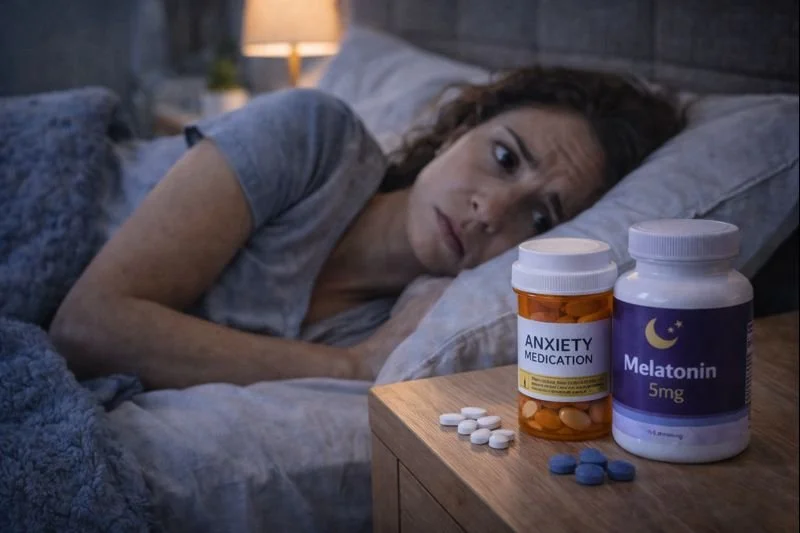How Anxiety and Sleep Are Connected — and What Meds Can Break the Cycle
How Are Anxiety and Sleep Related?
Anxiety and sleep disturbances often go hand in hand. For many, nighttime becomes a mental battleground—racing thoughts, restlessness, and physical tension make falling asleep nearly impossible.
According to the National Institute of Mental Health (NIMH), individuals with anxiety disorders are more likely to experience sleep disturbances like insomnia, frequent awakenings, or non-restorative sleep (NIMH, 2022). This cycle can become self-perpetuating: anxiety leads to poor sleep, and poor sleep increases anxiety.
The Science Behind the Cycle
How Anxiety Disrupts Sleep
Increased cortisol levels keep the body in a heightened state of alert.
Racing thoughts can prevent mental wind-down.
Hyperarousal of the nervous system interferes with transitioning into deeper stages of sleep.
How Poor Sleep Makes Anxiety Worse
Sleep deprivation reduces emotional regulation in the brain.
Impaired cognitive functioning makes it harder to manage stress.
Fatigue can worsen irritability, panic, and overthinking.
A study published in Sleep (Alfano et al., 2010) found that adolescents with generalized anxiety disorder had significantly poorer sleep quality compared to non-anxious peers, highlighting how tightly anxiety and sleep are linked.
Psychiatric Medications That May Help Break the Cycle
While therapy, mindfulness, and lifestyle changes are essential, many people benefit from psychiatric medications that treat anxiety and improve sleep. Here's a breakdown of common options.
1. SSRIs (Selective Serotonin Reuptake Inhibitors)
SSRIs are commonly prescribed for long-term anxiety management. They don’t work overnight but can regulate serotonin levels in the brain, gradually improving both anxiety and sleep quality.
Examples:
Escitalopram (Lexapro)
Sertraline (Zoloft)
Paroxetine (Paxil)
➡️ Study Insight: SSRIs have been shown to improve sleep continuity and reduce sleep latency in patients with anxiety disorders (Winkelman et al., 2005).
2. SNRIs (Serotonin-Norepinephrine Reuptake Inhibitors)
These medications target both serotonin and norepinephrine and may be effective for those with more severe anxiety or comorbid depression.
Examples:
Venlafaxine (Effexor XR)
Duloxetine (Cymbalta)
➡️ Study Insight: Duloxetine has demonstrated improvements in sleep disturbance associated with generalized anxiety disorder (Chambers et al., 2014).
3. Hydroxyzine
Hydroxyzine is a fast-acting antihistamine often used for short-term anxiety relief. It can also promote drowsiness and is sometimes used as a sleep aid.
When it's helpful:
Acute anxiety
Situational insomnia
Medication bridge while waiting for SSRIs to take effect
➡️ Study Insight: A double-blind trial found hydroxyzine effective in reducing anxiety symptoms while also aiding sleep (Lader et al., 2004).
4. Trazodone
Originally developed as an antidepressant, Trazodone is frequently prescribed at low doses for insomnia. It works by affecting serotonin levels and has sedative properties.
Why it's popular:
Non-addictive
Especially useful when sleep issues are severe
➡️ Study Insight: A review in Journal of Clinical Psychiatry found Trazodone improved both sleep initiation and maintenance in patients with comorbid depression and anxiety (Walsh et al., 1998).
Who Should Consider Medication?
Psychiatric medication isn’t a one-size-fits-all solution. But you might benefit if you:
Have trouble falling or staying asleep due to anxiety
Tried therapy or sleep hygiene without relief
Experience panic attacks or chronic worry at bedtime
Wake up feeling unrested despite “sleeping” 8+ hours
A mental health provider, such as a psychiatric nurse practitioner, can help determine the right medication through a personalized evaluation.
Telepsychiatry: Accessible Medication Support from Home
At Dignity Brain Health, we offer telehealth psychiatric medication management services across:
Massachusetts (Brookline, Cambridge, Somerville, Newton, Back Bay)
New Hampshire
Florida
Whether you’re seeking an adjustment to your current medication, or exploring options for the first time, our licensed professionals are here to help.
✅ We also offer genetic testing for psychiatric medications to better predict what may work best for your biology.
🧠 Partnering with Reputable Institutions
Dignity Brain Health’s providers have trained and worked at leading institutions, including:
Harvard Medical School
Mass General Hospital (MGH)
McLean Hospital
We also collaborate with mental health support networks like NAMI Massachusetts and refer to the Massachusetts Department of Mental Health for additional services.
FAQs About Anxiety, Sleep & Medication
Can I take anxiety meds just at night?
Yes, some medications (like hydroxyzine or low-dose Trazodone) can be taken at bedtime to reduce nighttime anxiety and aid sleep.
Will I become dependent on sleep medications?
Most psychiatric medications used for anxiety and sleep are not addictive, especially SSRIs, SNRIs, and Trazodone. Your provider will guide you.
Is it safe to combine anxiety meds with melatonin?
Usually, yes — but always discuss combinations with your prescriber to avoid interactions.
Conclusion: Healing Happens With the Right Tools
Struggling with anxiety and sleep? You’re not alone. The good news is: effective treatment exists—and you don’t have to wait months for help.
At Dignity Brain Health, we offer compassionate, evidence-based care via psychiatric medication management to help you break the cycle of anxiety and insomnia. With flexible telehealth options and experienced clinicians, healing can start now.
👉 Start your your online psychiatric medication consultation process now
📚 References
Alfano, C. A., Ginsburg, G. S., & Kingery, J. N. (2010). Sleep-related problems among children and adolescents with anxiety disorders. Sleep Medicine, 11(9), 875–881. https://doi.org/10.1016/j.sleep.2010.04.006
Winkelman, J. W., & Greenstein, D. (2005). Long-term SSRI use and sleep quality: A retrospective analysis of clinical data. Journal of Clinical Psychiatry, 66(11), 1415–1420. https://doi.org/10.4088/JCP.v66n1105
Chambers, R., & Seiden, D. (2014). Duloxetine for the treatment of generalized anxiety disorder in patients with sleep disturbance. CNS Spectrums, 19(2), 144–151. https://doi.org/10.1017/S1092852913000619
Lader, M., Scotto, J. C., & de la Gorce, F. (2004). Efficacy and tolerability of hydroxyzine in generalized anxiety disorder: A 3-month double-blind study. European Psychiatry, 19(4), 243–247. https://doi.org/10.1016/j.eurpsy.2004.04.002
Walsh, J. K., et al. (1998). Trazodone and sleep in patients with depression and anxiety. Journal of Clinical Psychiatry, 59(6), 300–305.

